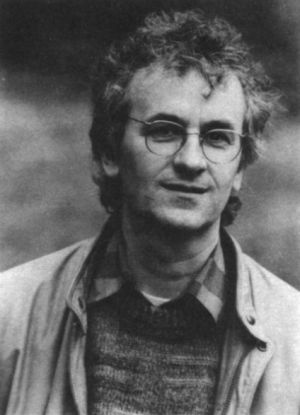One of our staff members is contributing considerably to a News Archiving service at Mu. Any well educated (Masters, PhD or above) users who wish to make comments on news sites, please contact Jim Burton directly rather than using this list, and we can work on maximising view count.
Gunter Schmidt: Difference between revisions
The Admins (talk | contribs) mNo edit summary |
No edit summary |
||
| (9 intermediate revisions by the same user not shown) | |||
| Line 1: | Line 1: | ||
'''Gunter Schmidt''' (born 22 November 1938) is a German sexologist, psychotherapist and social psychologist. Born in Berlin, Schmidt has written extensively on the sociological status of [[pedophilia]] in modern society. He regularly published with German researchers [[Volkmar Sigusch]] and [[Eberhard Schorsch]]. | [[File:Gunter Schmidt paidika.jpg|thumb|Gunter Schmidt (1989)<ref>Photo taken from Schmidt's 1989 interview with [[Paidika]].</ref>]]{{Template:Ac}}'''Gunter Schmidt''' (born 22 November 1938) is a German sexologist, psychotherapist and social psychologist. Born in Berlin, Schmidt has written extensively on the sociological status of [[pedophilia]] in modern society. He regularly published with German researchers [[Volkmar Sigusch]] and [[Eberhard Schorsch]]. | ||
Schmidt wrote the foreword ("The Debate on Paedophilia")<ref>Schmidt, ''[https:// | Schmidt wrote the foreword ("The Debate on Paedophilia")<ref>Schmidt, ''[https://sci-hub.hkvisa.net/10.1300/J082v20n01_01 The Debate on Paedophilia]'' (1991). ([https://doi.org/10.1300/J082v20n01_01 Non sci hub DOI])</ref> to the famous scholarly compendium on "Intergenerational Intimacy" (1991), published as a special issue in the [[Journal of Homosexuality]].<ref>[https://www.tandfonline.com/toc/wjhm20/20/1-2 "Intergenerational Intimacy" (1991) special issue].</ref> There, he wrote: | ||
::''A person's age, or the difference in age between the partners, says too little about the nature and quality of their relationship to justify making laws against such partnerships merely on the strength of this information... Each individual case must he looked upon on its own merits and, for this reason, the threat to make all pedophile acts punishable by law can barely be labeled civilized; on the contrary, it is unjust, for it implies that discrimination and persecution of a minority and should he abolished''. | |||
By 2002, Schmidt came to less 'radical' conclusions. He faced extensive discussion and criticism of his arguments about harm in intergenerational relationships, and the struggle / need to respect and tolerate the male pedophile, articulated in English in "The Dilemma of the Male Pedophile".<ref>[https://sci-hub.hkvisa.net/10.1023/a:1020651130148 The Dilemma of the Male Pedophile (2002)]. Archives of Sexual Behavior, Vol. 31, No. 6, December 2002.</ref> In a public debate with an opposing article by Dr. [[Richard Green]] on whether pedophilia (preferential attraction to people before puberty) should be considered a mental illness,<ref>Green, R. (2002). [https://www.ipce.info/library_2/files/green_asb_2002.html Is pedophilia a mental disorder?]. Archives of Sexual Behavior, 31, 2002.</ref> their two articles inspired a large number of replies that included many of the most famous figures in sexual science at the time: [[Robert Spitzer]] (the father of the modern DSM), [[Fred Berlin]], [[Michael Seto]], [[Bruce Rind]], [[Paul Okami]], and [[Vern Bullough]]. Their responses were collected and published in a single article entitled ''Peer Commentaries on Green (2002) and Schmidt (2002)''.<ref>[https://sci-hub.wf/10.1023/a:1020603214218 Peer Commentaries on Green (2002) and Schmidt (2002)]. Archives of Sexual Behavior, Vol. 31, No. 6, December 2002, pp. 479–503.</ref> Green published a short reply to these commentaries in a "Rejoinder" article (2002),<ref>Green, R. (2002). [https://sci-hub.wf/10.1023/a:1020655231056 Rejoinder]. Arch Sex Behav 31, 505–507.</ref> and Schmidt published his own reply to critics entitled "''Is There Nothing Special About Adult–Child Sex?''".<ref>Schmidt, G. [https://sci-hub.hkvisa.net/10.1023/a:1020607315127 Reply: Is There Nothing Special About Adult–Child Sex?]. ''Arch Sex Behav'' 31, 509–510 (2002).</ref> | |||
==Career== | ==Career== | ||
Schmidt was the director of the centre for sexual research in the clinic of the University Medical Center Hamburg-Eppendorf (Eppendorf) | Schmidt was the director of the centre for sexual research in the clinic of the University Medical Center Hamburg-Eppendorf (Eppendorf). He was a director of the ''Deutsche Gesellschaft für Sexualforschung'' (DGfS) and president of ''International Academy of Sex Research'' (IASR). | ||
Together with Martin Dannecker and Volkmar Sigusch, he is editor of Beiträge zur Sexualforschung (87 editions which is published by Psychosozial-Verlag). Schmidt is also co-editor of the magazine Zeitschrift für Sexualforschung in the Georg Thieme Verlag. | He is the director of a research project Pregnancy and Abortion by Young Women and a member of the board of directors for the organisation ''pro familia'', an NGO for sexual and reproductive health and rights in Germany. Together with [[Martin Dannecker]] and [[Volkmar Sigusch]], he is editor of ''Beiträge zur Sexualforschung'' (87 editions which is published by Psychosozial-Verlag). Schmidt is also co-editor of the magazine ''Zeitschrift für Sexualforschung'' in the Georg Thieme Verlag. | ||
==References== | ==References== | ||
[[Category:Official Encyclopedia]][[Category:Sociological Theory]][[Category:Youth]][[Category:Research]][[Category:Research into effects on Children]][[Category:People]][[Category:People: German]][[Category:People: Deceased]][[Category:People: Academics]][[Category:History & Events: German]] | [[Category:Official Encyclopedia]][[Category:Sociological Theory]][[Category:Youth]][[Category:Research]][[Category:Research on Minor Attraction]][[Category:Research on "Child Molesters"]][[Category:Research into effects on Children]][[Category:Research: Broader Perspectives]][[Category:People]][[Category:People: German]][[Category:People: Deceased]][[Category:People: Academics]][[Category:People: Critical Analysts]][[Category:History & Events: German]] | ||
Latest revision as of 19:03, 24 April 2024

Gunter Schmidt (born 22 November 1938) is a German sexologist, psychotherapist and social psychologist. Born in Berlin, Schmidt has written extensively on the sociological status of pedophilia in modern society. He regularly published with German researchers Volkmar Sigusch and Eberhard Schorsch.
Schmidt wrote the foreword ("The Debate on Paedophilia")[2] to the famous scholarly compendium on "Intergenerational Intimacy" (1991), published as a special issue in the Journal of Homosexuality.[3] There, he wrote:
- A person's age, or the difference in age between the partners, says too little about the nature and quality of their relationship to justify making laws against such partnerships merely on the strength of this information... Each individual case must he looked upon on its own merits and, for this reason, the threat to make all pedophile acts punishable by law can barely be labeled civilized; on the contrary, it is unjust, for it implies that discrimination and persecution of a minority and should he abolished.
By 2002, Schmidt came to less 'radical' conclusions. He faced extensive discussion and criticism of his arguments about harm in intergenerational relationships, and the struggle / need to respect and tolerate the male pedophile, articulated in English in "The Dilemma of the Male Pedophile".[4] In a public debate with an opposing article by Dr. Richard Green on whether pedophilia (preferential attraction to people before puberty) should be considered a mental illness,[5] their two articles inspired a large number of replies that included many of the most famous figures in sexual science at the time: Robert Spitzer (the father of the modern DSM), Fred Berlin, Michael Seto, Bruce Rind, Paul Okami, and Vern Bullough. Their responses were collected and published in a single article entitled Peer Commentaries on Green (2002) and Schmidt (2002).[6] Green published a short reply to these commentaries in a "Rejoinder" article (2002),[7] and Schmidt published his own reply to critics entitled "Is There Nothing Special About Adult–Child Sex?".[8]
Career
Schmidt was the director of the centre for sexual research in the clinic of the University Medical Center Hamburg-Eppendorf (Eppendorf). He was a director of the Deutsche Gesellschaft für Sexualforschung (DGfS) and president of International Academy of Sex Research (IASR).
He is the director of a research project Pregnancy and Abortion by Young Women and a member of the board of directors for the organisation pro familia, an NGO for sexual and reproductive health and rights in Germany. Together with Martin Dannecker and Volkmar Sigusch, he is editor of Beiträge zur Sexualforschung (87 editions which is published by Psychosozial-Verlag). Schmidt is also co-editor of the magazine Zeitschrift für Sexualforschung in the Georg Thieme Verlag.
References
- ↑ Photo taken from Schmidt's 1989 interview with Paidika.
- ↑ Schmidt, The Debate on Paedophilia (1991). (Non sci hub DOI)
- ↑ "Intergenerational Intimacy" (1991) special issue.
- ↑ The Dilemma of the Male Pedophile (2002). Archives of Sexual Behavior, Vol. 31, No. 6, December 2002.
- ↑ Green, R. (2002). Is pedophilia a mental disorder?. Archives of Sexual Behavior, 31, 2002.
- ↑ Peer Commentaries on Green (2002) and Schmidt (2002). Archives of Sexual Behavior, Vol. 31, No. 6, December 2002, pp. 479–503.
- ↑ Green, R. (2002). Rejoinder. Arch Sex Behav 31, 505–507.
- ↑ Schmidt, G. Reply: Is There Nothing Special About Adult–Child Sex?. Arch Sex Behav 31, 509–510 (2002).
